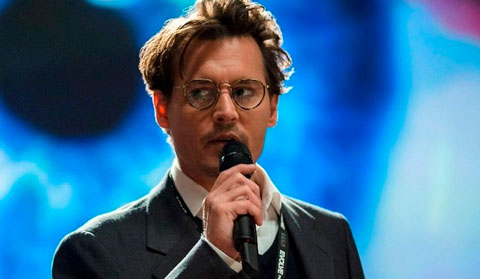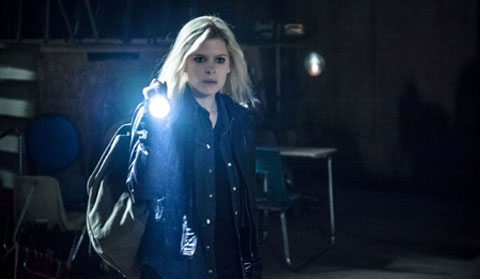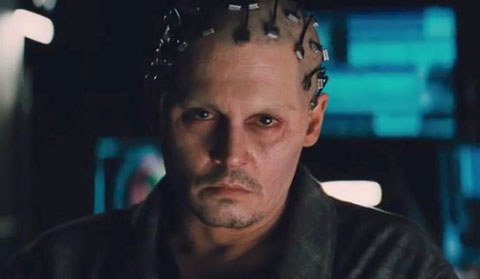Get ready for a mind-bending Transcendence, with Johnny Depp as a godly scientist and researcher in the field of artificial intelligence, working to create a sentient machine that combines the collective intelligence of everything ever known with the full range of human emotions.
His highly controversial experiments have made him famous, but they have also made him the prime target of anti-technology extremists who will do whatever it takes to stop him. However, in their attempt to destroy him, they inadvertently become the catalyst for him to succeed-to be a participant in his own transcendence. For his wife Evelyn (Rebecca Hall) and best friend Max Waters (Paul Bettany), both fellow researchers, the question is not if they can, but if they should. Their worst fears are realized as Will's thirst for knowledge evolves into a seemingly omnipresent quest for power, to what end is unknown. The only thing that is becoming terrifyingly clear is there may be no way to stop him.
Is artificial intelligence a threat to the way we live our lives today? Perhaps not yet, but what happens if we take it to the next level; if computers are given the capacity not only to think, but to feel?
Set in the not-too-distant future, Transcendence explores the very real possibility that humans-in our attempts to create a better, more efficient, more self-sustaining world through technology-can go too far. For emotions are not always positive: Doesn't a machine that has the capacity for kindness also have the capacity for menace?
Directorial debut
Wally Pfister, a renowned cinematographer and Oscar winner for Inception and The Dark Knight, makes his feature directorial debut in the film.
"I was struck by the power and the weight of the ideas in this story, which I think are very much on people's minds right now.
"Transcendence" proposes that we can achieve what's been called singularity. Pfister comments: "As we define it for the film, singularity is basically the uploading of the human brain into a super computer: the duplication of every synapse, every neuron, every bit of activity in the brain goes into a machine, which then becomes sentient."
The film seeks to exemplify the coercive nature of the machines we create and how they control us as a culture. It is a path one could argue we are already on, and the film endeavours to project where we could be in 10 or 20 years as revolutionary, exciting and equally troubling.
Johnny Depp stars as the scientist who not only provides the breakthroughs to make singularity-transcendence-possible, but whose brain becomes its first test subject. "What I really found intriguing about this story was the idea that one man with a brilliant mind, a simple guy who adores his wife and does the crossword puzzle every morning, is able to take his expertise to the point where ego, power and passion could ultimately evolve him into something of a mechanical god."
A big, exciting action thriller
Producer Andrew A Kosove found the subject matter equally fascinating when he read the screenplay. "I have always been interested in how advancing technologies impact on people's lives. I thought that the writer Jack Paglen posed the question beautifully as to what defines a person versus an inanimate object, and he wrapped it up in a big, exciting action thriller."
Producer Broderick Johnson liked what he calls "the juxtaposition of an action thriller with a very emotional, relatable core-the collision of technology with the human experience". But the idea that a loved one could be uploaded into a computer and you could then continue that relationship beyond its physical form was the heart of the film for me, he said.
"I love Jack's writing," producer Annie Marter relates, "and I'd wanted to work with him for a long time. Then I read about singularity and was instantly gripped by the idea. I thought it was both captivating and scary, and, surprisingly, not all that far-fetched. Jack and I talked about it, and he agreed."
Paglen, who for some time had been toying with the basic premise, developed the story by first speaking with his wife, a computer scientist. "She's my secret weapon," he smiles. "We talked out the sci-fi angle." Developing the idea with Marter, he continues, "it all really came together with the idea of a woman trying to save her husband's life by any means possible, even if her only option was keeping him alive in a virtual way," he continues. "That opened up a world of possibilities for me, and the emotional storyline humanises the actions of these characters while also allowing the audience to question them."
Pfister loved the screenplay and sought additional information from several experts, including University of California, Berkeley's Dr Jose Carmena, Professor of Electrical Engineering and Neuroscience, and Dr Michel Maharbiz, Professor of Electrical Engineering, who served as technical consultants on the film. He also contacted former California Institute of Technology researcher Christof Koch, who is now chief scientific officer with the Allen Institute for Brain Science in Seattle. Through his work with them and others, Pfister discovered that the script's scientific premises were not quite as fantastical as he originally thought. Progress in their various fields of research - neurosciences, nanotechnology, cell research and robotics-is slowly turning science fiction into fact.
Carmena notes: "I think the premise of the film is definitely inspiring and futuristic, and, at the same time, forward looking with respect to developments in brain-machine interfaces."
Dramatic licence
The filmmakers naturally took some dramatic licence in order to serve the plot and the "what-if" thriller aspect of the film. They also wanted to make what is an extremely intellectual study clear and accessible to the audience, and to provide a feeling of suspense and danger as the story progressed. However, as Maharbiz says: "Certainly it's a sci-fi movie, but the root of a lot of the issues discussed, especially in the first half of the film, are being researched in real time."
"Every day, these guys are pushing the frontiers of technology," says producer Aaron Ryder. "It's exciting just to have a conversation with them. They were absolutely instrumental in helping us not only tell the story, but to understand the story we were telling with respect to the advancements in AI and singularity."
"Imagine your brain suddenly being able to connect to the internet, to have access to every bit of information there-financial, medical, political," Pfister posits. "What would you do with that kind of knowledge, that kind of ultimate power? Would you use it for the greater good, or your own gain, or something else entirely? This film gives movie-goers a chance to see the possibilities and wonder if it's a choice they'll ever have to face."
The seasoned Depp found the first-time director "incredibly collaborative, very open. His approach to each shot was not only technically appealing, thanks to his background behind the camera, but there was real poetry and emotion in the way he saw each scene playing out and the way he wanted to tell the story. I think he really made a seamless transition."
Turning to his character, Depp says: "Will's a good guy who has the world's best interests at heart in trying to achieve transcendence, but because he becomes so powerful, has access to basically all the information on the internet and believes in his own methods, it becomes very hard to stop him. Anyone with that much control, even with what may be the best of intentions, well - there will always be those who see things differently. In Will's case, it seems like it may be too late to stop him."
The filmmakers and cast reflect that the movie poses some profound questions within its sci-fi storyline and raises some thought-provoking scenarios about the effects that advancing, evolving technologies might have on our culture and on us as individuals.
My god is better than your god
"People have been fighting wars over 'my god is better than your god' for thousands of years," Depp says. "In the 21st century, I think it's appropriate to look at the way human beings worship technology and what that could mean for our future. Whether you're on the side of technology or ecology, a pacifist or an extremist, most people have very definite opinions, and the question of how far we should allow our dependence on computers to go is a question that needs to be asked."
Pfister summarises: "According to the experts, artificial intelligence of the sort we present in Transcendence is coming, like it or not. What I wanted to do with the film is give people a peek into one direction our world could take in the coming decades, and engage them in an emotional, moral and intellectual debate about this very timely topic in a way that is both thought provoking and entertaining."
When you leave the cinema your thoughts and imagination will be on overdrive as you transcend into the reality of everyday life, realising how great good storytelling in all its spectacular splendour can be on the big screen.
For more on this film and other new releases, go to www.writingstudio.co.za.
![Today, Halo and Demographica announce a new specialist agency, Second Rodeo]], headed up by Mike Stopforth (left). Dean Oelschig, managing partner and founder of Halo (right) says they will work as a group but ultimately, each agency will be an individual specialist](https://biz-file.com/c/2505/772543-300x156.jpg?2)





























![Today, Halo and Demographica announce a new specialist agency, Second Rodeo]], headed up by Mike Stopforth (left). Dean Oelschig, managing partner and founder of Halo (right) says they will work as a group but ultimately, each agency will be an individual specialist](https://biz-file.com/c/2505/772543-64x64.jpg?2)







